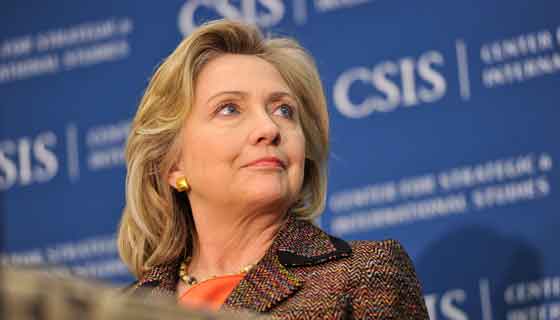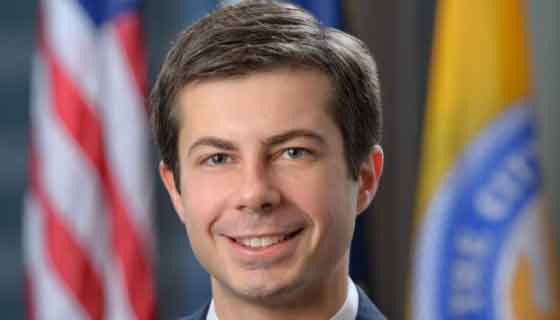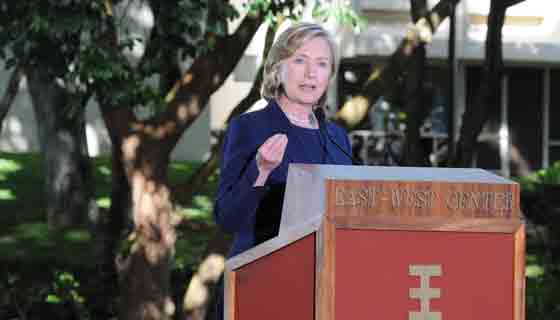With tensions still simmering on the streets of Baltimore and a national movement against a discriminatory U.S. justice system continuing to build, presidential hopeful Hillary Clinton made a strong statement Wednesday morning vowing to bring to an end the “era of mass incarceration.”
“We don’t want to create another incarceration generation,” said the former Secretary of State during her keynote speech at the 18th Annual David N. Dinkins Leadership and Public Policy Forum at Columbia University. “We need a true national debate about how to reduce our prison population while keeping our communities safe.”
In the first major address since announcing her presidential bid, Clinton took a strong stand against policies put into place by her husband, former President Bill Clinton—policies that she herself supported in the 1990s when she called for tougher prison sentences and “more prisons.”
While Clinton’s time on the campaign trail has thus far been bereft of any substantive press statement, her comments Wednesday mark one of the first indications of a platform she may put forth as candidate.
Acknowledging that she doesn’t “know all the answers,” Clinton listed a number of potential reforms including: alternative punishments for low level offenders; “probation and drug diversion programs to deal ‘swiftly’ with violations while letting low level offenders stay out of prison;” as well as specialized drug courts and juvenile programs.
Further, Clinton applauded efforts by President Barack Obama and former U.S. Attorney General Eric Holder to amend the “unjust” sentencing disparity between crack and cocaine charges and reduce prison terms for some drug crimes.
And, Clinton added emphatically, “please let us put mental health back on the top of our national agenda.” Describing the failure of governments to create community-based treatment centers after the widespread closure of mental health facilities, she said, “Our prisons and our jails are now our mental health institutions.”
Her comments come as a national spotlight has been put on the United States’ policing and incarceration policies that for years have targeted young men of color, which critics say has created a permanent “underclass” in American society.
Recent killings of black men by police—the latest being the tragic death of Freddie Gray in Baltimore—have sparked widespread demonstrations and calls for reform in each level of the U.S. system of justice: from police militarization, “broken windows” policing, and sentencing laws, to policies such as the War on Drugs that create criminal penalties for minor offenses.
In her book The New Jim Crow, legal scholar, civil rights advocate, and attorney Michelle Alexander points out that it was former President Bill Clinton who put in place many of the policies that led to the prison population boom.
Alexander wrote:
[Bill] Clinton’s ‘tough on crime’ policies resulted in the largest increase in federal and state prison inmates of any president in American history. But Clinton was not satisfied with exploding prison populations. He and the ‘New Democrats’ championed legislation banning drug felons from public housing (no matter how minor the offense) and denying them basic public benefits, including food stamps, for life. Discrimination in virtually every aspect of political, economic, and social life is now perfectly legal, if you’ve been labeled a felon.
As if anticipating such criticisms, in the forward to a recently-published book of essays by politicians on mass incarceration compiled by the Brennan Center for Justice, the former president wrote that these very same policies “overshot the mark,” resulting in “too many people in prison and for too long.”
In the conclusion to her address Wednesday, Hillary Clinton seemed to be appealing directly to those observing the “riots” and “violence” in Baltimore, put forth by the mainstream media.
“We can restore balance to our justice system and we can make sure that we take actions that are going to make a difference in the lives of those who for too long have been marginalized and forgotten,” she said. “We can’t separate the unrest we see in our streets from the cycles of poverty and despair that hollow out those neighborhoods.”
Image Credit: East-West Center, flickr
This article originally appeared on Common Dreams.











